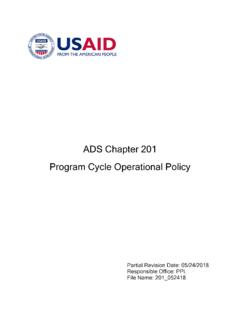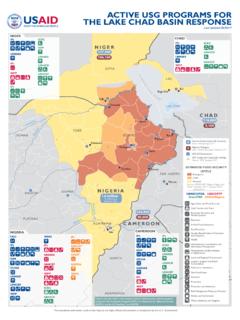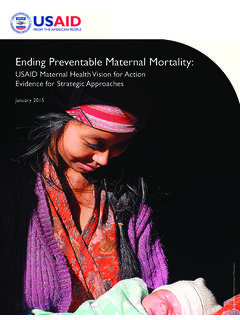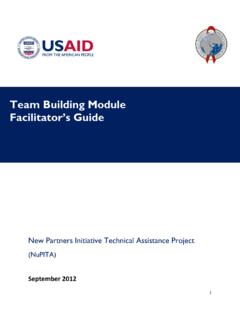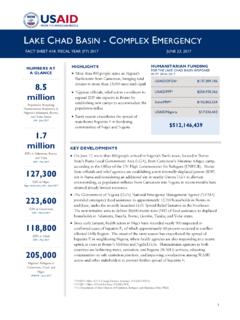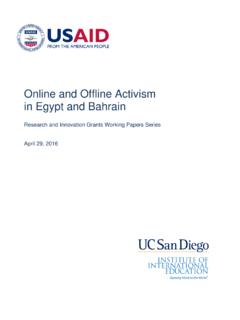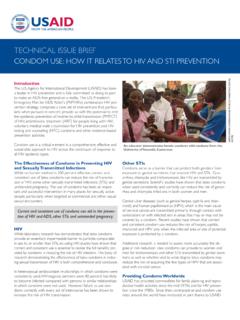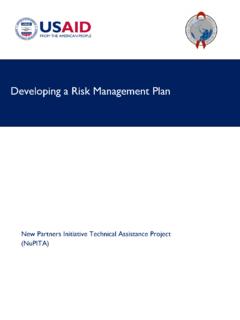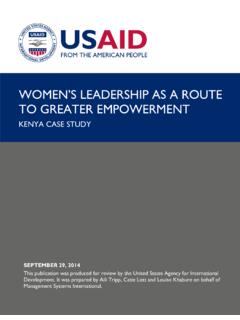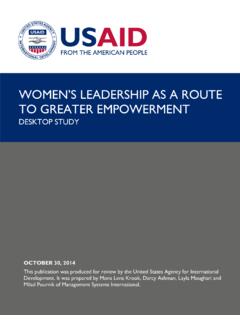Transcription of USAID LOCAL CAPACITY DEVELOPMENT POLICY
1 1 LOCAL CAPACITY DEVELOPMENT POLICY AUGUST 2021/VERSION 8 2 LCD POLICY EXECUTIVE SUMMARY Developing LOCAL actors CAPACITY is a foundational component of USAID programming that has contributed to humanitarian and DEVELOPMENT gains around the world. LOCAL CAPACITY DEVELOPMENT is the cornerstone of sustainable DEVELOPMENT , which depends on LOCAL actors designing and leading efforts to improve their communities. Developing LOCAL CAPACITY is critical to addressing underlying factors of fragility, strengthening LOCAL humanitarian response systems, and enhancing resilience to shocks and stresses. And it is vital to ensuring that marginalized and underrepresented groups have the skills and opportunities to lead on their country s DEVELOPMENT .
2 Over the past two decades, consensus has emerged across the DEVELOPMENT landscape around the importance of LOCAL CAPACITY DEVELOPMENT , yet Agency POLICY has not been updated to reflect this consensus. The LOCAL CAPACITY DEVELOPMENT POLICY addresses this gap and affirms USAID global leadership by providing a unifying and authoritative direction for the Agency based on mutual respect, reciprocity, and locally led CAPACITY DEVELOPMENT . USAID s LOCAL CAPACITY DEVELOPMENT POLICY establishes an Agency-wide vision and common approach towards developing LOCAL CAPACITY that can be applied and adapted across the wide variety of sectors, contexts, countries, and sets of actors with which the Agency works.
3 This vision and approach are expressed through a framework and set of principles that will guide future USAID humanitarian assistance and DEVELOPMENT programming. By implementing this POLICY , USAID is adopting a shared definition and understanding of LOCAL CAPACITY DEVELOPMENT that will reorient its programmatic approaches toward achieving locally-led and -sustained DEVELOPMENT outcomes. Two mutually reinforcing pillars guide the Agency s LOCAL CAPACITY DEVELOPMENT POLICY : a LOCAL CAPACITY DEVELOPMENT framework and seven LOCAL CAPACITY DEVELOPMENT principles. The framework pillar (provided in Section II) outlines a process for making the decision to invest in LOCAL CAPACITY DEVELOPMENT of specific actors in order to contribute to sustainable systems-level outcomes.
4 The framework comprises two interdependent analytical processes: (1) a Systems Analysis, through which we make a determination to invest in strengthening the capacities of select actors as a means to improve system Seven Principles to Guide Effective LOCAL CAPACITY DEVELOPMENT PRINCIPLE 1: Start with the LOCAL system. PRINCIPLE 2: Develop diverse capacities through diverse approaches. PRINCIPLE 3: Align CAPACITY DEVELOPMENT with LOCAL priorities. PRINCIPLE 4: Appreciate and build on existing capacities. PRINCIPLE 5: Be mindful of and mitigate the unintended consequences of our CAPACITY DEVELOPMENT . PRINCIPLE 6: Practice mutuality with LOCAL actors. PRINCIPLE 7: Measure performance improvement in collaboration with LOCAL actors.
5 3 performance, and (2) Selection of Approach, where we identify the appropriate approach or set of approaches for strengthening the CAPACITY of those actors. The second pillar consists of seven principles for effective LOCAL CAPACITY DEVELOPMENT (Section III) that should guide how we support, engage with, and devolve power and leadership to LOCAL actors throughout the above-mentioned framework and across USAID s Program Cycle. These principles, along with the framework, will guide USAID in making strategic and intentional decisions related to strengthening the CAPACITY of LOCAL actors in a manner that is inclusive, equitable, and rooted in LOCAL leadership and ownership. Section IV of the POLICY describes a change management process for putting the framework and principles into practice that includes the following action areas: 1) Integrate effective LOCAL CAPACITY DEVELOPMENT into the Agency s Program Cycle.
6 2) Align Agency POLICY and resources with effective LOCAL CAPACITY DEVELOPMENT practice. 3) Develop and disseminate technical guidance on LOCAL CAPACITY DEVELOPMENT to the field. 4) Continue to advance procurement reform. 5) Incentivize and support uptake of the POLICY among the Agency s Missions and Operating Units. 6) Spearhead innovation, learning, and accountability across USAID . This process is intended to operationalize the Agency s vision for LOCAL CAPACITY DEVELOPMENT , whereby USAID contributes to achieving and sustaining DEVELOPMENT outcomes and effective LOCAL humanitarian response systems by making strategic and intentional decisions about why and how to invest in the CAPACITY of LOCAL actors, based on a shared understanding of the principles for effective LOCAL CAPACITY DEVELOPMENT .
7 4 A SHARED VISION FOR LOCAL CAPACITY DEVELOPMENT CAPACITY DEVELOPMENT of LOCAL actors is and has been a foundational component of USAID programming that has contributed to humanitarian and DEVELOPMENT gains around the world. Strong LOCAL CAPACITY is a cornerstone of sustainable DEVELOPMENT , which depends on LOCAL actors designing and leading efforts to improve their communities and working inclusively and collectively to see those efforts through. Effective LOCAL CAPACITY DEVELOPMENT can also address underlying factors of fragility, strengthen LOCAL humanitarian response systems, and enhance resilience to shocks and stresses, ultimately supporting countries to prevent, mitigate, and recover from crises.
8 Moreover intentional and strategic CAPACITY DEVELOPMENT can help ensure that individuals from marginalized and underrepresented groups, including LGBTQI+ people, women and girls, persons with disabilities, indigenous peoples, marginalized ethnic and religious populations, internally displaced persons, youth and elderly, and other socially marginalized individuals, have the skills and opportunities to meaningfully lead in the DEVELOPMENT of their communities and country. In short, the CAPACITY of LOCAL actors is a key determinant of success in both the DEVELOPMENT and humanitarian assistance spaces. Over the past two decades, consensus has emerged across the DEVELOPMENT landscape around the importance of LOCAL CAPACITY DEVELOPMENT in contributing to sustainable change.
9 High level commitments of international DEVELOPMENT organizations, donors, and developing country governments, including those made at aid effectiveness global summits in Paris, Accra, and Busan, and reinforced through international agreements such as the Sustainable DEVELOPMENT Goals (SDGs), have stressed the centrality of national CAPACITY and LOCAL ownership to achieving sustainable outcomes. LOCAL actors have also affirmed the importance of CAPACITY DEVELOPMENT that is strategic, inclusive, and locally led. Consultations with LOCAL actors to inform this POLICY reflect an agreement that CAPACITY DEVELOPMENT programming enables LOCAL individuals, organizations, and networks to better serve their communities, respond more effectively in crisis situations, develop specialized sectoral expertise, mobilize resources, influence POLICY , and eventually move beyond the need for donor funding.
10 However, LOCAL actors have also long expressed concerns about how donors and international organizations understand and support CAPACITY DEVELOPMENT : they repeatedly highlight the tremendous LOCAL CAPACITY that already exists and often goes untapped by international actors. CAPACITY , as understood and used by USAID , is the ability of an actor to perform, sustain itself, and self-renew. CAPACITY encompasses the knowledge, skills, and motivations, as well as the relationships, that enable an actor an individual, an organization, or a network to take action to design and implement solutions to LOCAL DEVELOPMENT challenges, to learn and adapt from that action, and to innovate and transform over time.
